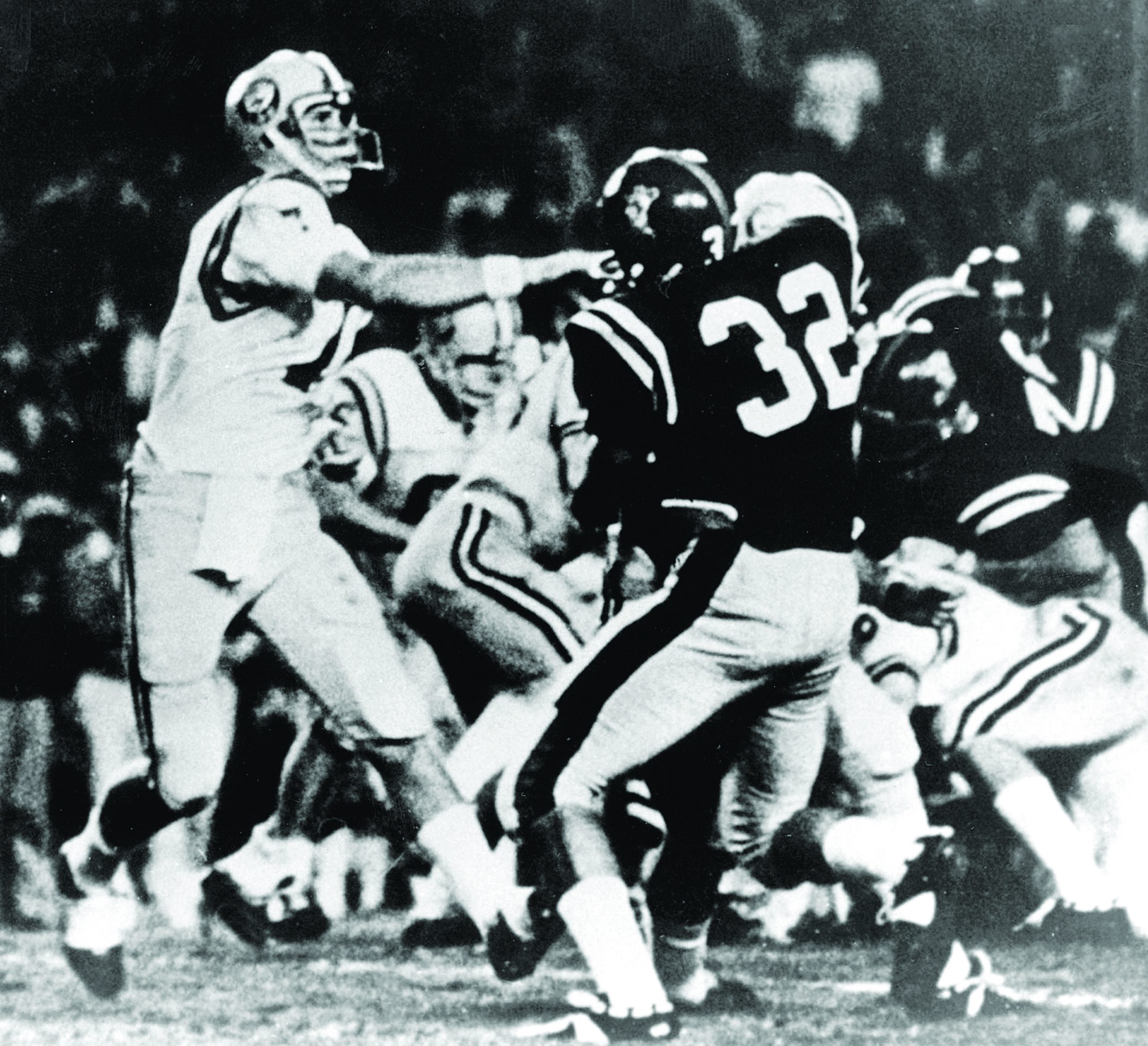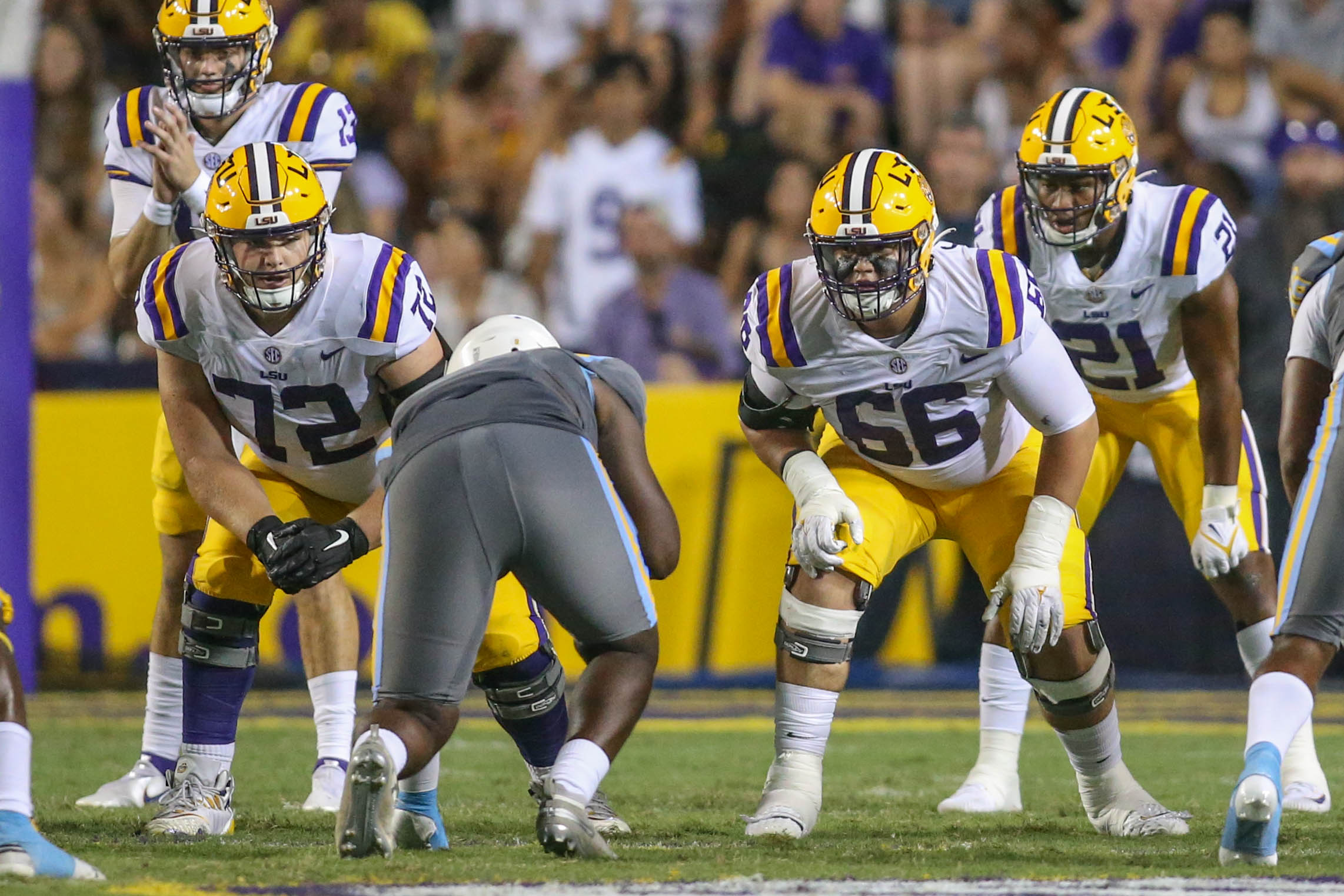
GLENN GUILBEAU, Tiger Rag Editor
One of the wildest songs by Bruce Springsteen with rhyming lyrics all over the place was “Blinded By The Light” from his debut album, “Greetings From Asbury Park, N.J.” that came out in January of 1973.
The song was partly about Springsteen playing baseball as a kid and was filled with some of his all-time most clever lyrics, including, “Mama always told me not to look into the eyes of the sun, but Mama, … that’s where the fun is!”
It wasn’t, but the song could have been about LSU tailback Brad Davis. The then-sophomore from Hammond just two months previously caught a game-winning, 10-yard touchdown pass from Bert Jones after time had expired – actually should have expired before the play – for a 17-16 win over Ole Miss on Nov. 4, 1972.
Davis just got his feet across the flag and inbounds in the southeast corner of Tiger Stadium, but his eyes didn’t see the ball as he somehow caught it.
“I lost it in the lights,” Davis told Tiger Rag from his home last month in Opelousas, where he still practices as a dentist at age 71. “There was a lower row of lights in the stadium that I looked right into as the ball was coming.”
And it was not one of the strong-armed Jones more beautiful passes. The Ruston Rifle usually threw tight, hard spirals for miles.
“I threw a terrible pass,” Jones told Tiger Rag from his home in Ruston last month. “I didn’t realize it until I saw a replay. And I have no idea why. But it gave Brad a great opportunity to catch it. All he had to do was grab one end, because it was an end-over-end pass. I was trying to make it easy for him.”
Davis prepared to catch one of the ends as the ball came toward him.
Bert Jones TD Pass Looked More Like A Field Goal
“It looked like Bert had kicked the ball to me instead of throwing it,” Davis said. “It looked like a wounded duck. Then I lost it in the lights for a second. But it hit me right in the right hand. I just felt it and grabbed it. I didn’t have much room. I had run right to the flag. I was trying to get across the line.”
He did barely to tie the score at 16-16.
“It was a bam-bam play,” Davis said. “Not time to think about anything. And as soon as I got a hand on it, the safety hit me. Then I fell across the flag. I just got my shoulder pad inside it.”
Rusty Jackson kicked the extra point for the 17-16 win. And No. 6 LSU stayed undefeated at 7-0 going into its huge tilt at No. 2 Alabama in Birmingham the next week on ABC. Unranked Ole Miss dropped to 4-4.
Jones, a senior from Ruston High who would finish fourth in the Heisman Trophy race in December, took LSU 80 yards in 3:02 for the game-winning touchdown. Well, 3:02, and some change, you might say.
The Day The Clock Stood Still
The story of this game was not the game-winning touchdown. It was how LSU even got to that play. Before Davis was “Blinded by the Light,” a remake of the 1951 sci-fi thriller “The Day The Earth Stood Still” happened at Tiger Stadium with a new name, “The Day The Clock Stood Still.”
Two plays before the winning touchdown pass, LSU was on the Ole Miss 20-yard line when Jones threw over the middle for split end Gerald Keigley, but an Ole Miss defender knocked him down before the ball arrived. Interference was called, and LSU got a first down at the 10-yard line with just four seconds remaining.
Time enough for one more play, right? That’s what I was thinking listening to the game on the radio in Metairie with my dad as an 11-year-old.
“Time for one play in the game,” is exactly what the great John Ferguson, the Voice of LSU Football, said at the time. “Four seconds to go in the game. First down for LSU after the pass interference at the 10-yard line. But all that means nothing unless the Tigers can get the ball into the end zone on this play. And a big season rides on this play and the right arm of Bert Jones.”
Jones threw over the middle again and into the end zone for senior split end Jimmy LeDoux. But Mickey Fratesi broke up the pass cleanly, and Ole Miss fans went wild. Some even started for the field.
But a bright “00:1” flickered on the Tiger Stadium scoreboard.
“One second left to go,” Ferguson said almost in disbelief. “One second to go. The pass was broken up in the end zone. One second to play.”
My dad and I just started laughing. How can Jones take the snap, drop back, throw 17 yards into the end zone, see the pass broken up and the ball fall to the ground all in only three seconds?
“There’s no way that next to last play could have taken only three seconds,” Ole Miss safety Harry Harrison told Parrish Alford of the Northeast Mississippi Daily Journal in 2022. “We were convinced we’d won the football game.”
And LSU’s own players thought they had lost … before they noticed the 1 second.
Bert Jones: “I had a really quick release”
“Honestly, I did think it was over,” Jones said. “But it only reinforces the fact that I had a really quick release. You’ve got to have a quick release to be able to throw two passes in four seconds.”
Jones, 73, quickly developed an entire routine of one-liners after being hounded about the “timeliness” of the last play by Ole Miss people from Nov. 4, 1972, on.
“We thought the game was over,” Davis said. “I mean there was four seconds left before the last play. But when we looked up, there was one second left. Everybody thought it was over before that. We were all getting ready to walk off the field.”
Then Davis laughed a little.
“I guess it was a slow clock,” he said.
Rumors soon began swirling from angry Ole Miss fans that the clock operator was related to Jones.
“It was only a second or third cousin,” Jones joked. “Not really a relative.”
‘Slow’ Clock Operator Located 27 Years Later
The clock operator that infamous night was not a Jones. His name was Jim Campbell, and he served as an SEC official and clock operator in the 1960s and ’70s. The Baton Rouge Advocate’s Scott Rabalais and myself (an Advocate writer from 1998-2004) interviewed him before LSU’s game against Houston of Conference USA on Nov. 13, 1999, in the Tiger Stadium press box. Campbell was working as the supervisor of officials for C-USA at the time.
“There’s an old proverb. Let sleeping dogs like,” Campbell told us when we asked him about the 1972 LSU-Ole Miss game. Campbell had been bombarded with calls from angry Ole Miss games after that game.
The Ole Miss press guide the next year printed the score from the game, “Ole Miss 16, LSU 10 … + 7.”
It remains one of the most remembered Tiger Stadium games in history.
And the call of the final play by Ferguson after he thought he had just called the final play remains a classic:
John Ferguson’s Call Of The Play
“Here it is the game over,” Ferguson said as Jones took the final snap with the horn sounding immediately. “Jones back to throw, looking for a receiver. He has Davis. It is … SCORE! TOUCHDOWN on the last play of the game. Brad Davis catches a Bert Jones pass in the corner of the end zone!”
Ferguson sounds as shocked as an Ole Miss fan may have.
“The game is tied 16-16,” Ferguson says, but you can barely hear him from the crowd noise as 70,502 strong were in the stadium for the 8 p.m. kickoff and remained.
“Almost the entire Tigers’ bench has spilled onto the field in the excitement,” Ferguson said. “And so, we’ll have the point after by Rusty Jackson. The game is over, and the score is tied 16-16.”
Ferguson repeated the score as if still in disbelief.
“Rusty Jackson is in the game to try and make it a 17-16 game,” he said. “Paul Lyons will hold. And the game rides on this kick now. Here is the extra point. Jackson boots it! TIGERS WIN, 17-16. And pandemonium breaks loose at Tiger Stadium!”
Paul Manasseh, LSU’s sports information director extraordinaire that night, met LSU coach Charles McClendon on the field after the game with the perfect one-liner.
“Mac, if you had any guts,” Manasseh said, “you would’ve gone for two.”




Be the first to comment